2018 in Review: Reflecting on Our Achievements, Part 2
Part 2 of our “2018 Year in Review” focuses on the research institutes and centers that are part of the UF Health family:
- Cancer Center
- Clinical and Translational Science Institute
- Diabetes Institute
- Emerging Pathogens Institute
- Evelyn F. & William L. McKnight Brain Institute
- Genetics Institute
- Institute for Child Health Policy
- Institute on Aging
Cancer Center
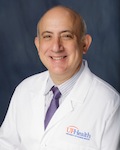 Director: Jonathan D. Licht, M.D.
Director: Jonathan D. Licht, M.D.
The University of Florida Health Cancer Center continues to prepare for submission of a Cancer Center Support Grant from the National Cancer Institute this May. A presentation to the External Advisory Board in March 2018 was followed by endorsement of our plan for submission of the grant.
In June and November 2018, several of our associate directors and I visited the National Cancer Institute Office of Cancer Centers to present an overview of our university resources, catchment area, research programs and shared resources that would be supported by the Cancer Center Support Grant. We provided an overview of our progress, how we fulfill the six essential characteristics of an NCI-designated cancer center, including space, organizational structure and leadership; our cancer focus (basic, clinical and translational collaborative research); and our UF institutional commitment to cancer research.
The presentation was well-received, and the director of the office believes we are well-placed to submit a competitive application. In it, we will present three research programs: the Cancer Population Sciences program; Mechanisms of Oncogenesis, a basic science research program; and Cancer Therapeutics and Host Response, a translational science program. There will be a request for support of our clinical research office and our shared resources, including flow cytometry, next-generation sequencing and biostatistics and quantitative sciences.
The biostatistics and quantitative sciences shared resource was initiated after a national search and the recruitment of Dr. Ji-Hyun Lee from the University of New Mexico Comprehensive Cancer Center to direct the unit. Dr. Lee assembled an array of statisticians, informaticians and other quantitative scientists available for collaborations with Cancer Center members. She instituted a weekly biostatistics walk-in clinic, in which faculty and trainees may come to have immediate questions answered. Additionally, she is developing a web portal for handling of biostatistics requests and setting up new courses in biostatistics and bioinformatics for faculty and trainees.
In 2018, we instituted an Office of Community Outreach and Engagement staffed by medical anthropologist Sarah Szurek, Ph.D. Throughout the fall, our community advisory board engaged in generating ideas for programs to increase cancer awareness screening and prevention in our catchment area, with particular attention to the underserved communities in Gainesville and other rural regions. Also notable this past year was an award from the National Cancer Institute of a U54 grant titled the Florida-California Cancer Research, Education & Engagement (CaRE2) Center, a collaboration with the University of Southern California and the Florida Agricultural and Mechanical University. The center is led at UF by Diana Wilkie, Ph.D., R.N., FAAN, co-leader of the Cancer Center’s Cancer Population Sciences research program, and Folakemi T. Odedina, Ph.D., a professor of pharmacotherapy and translational research in the UF College of Pharmacy. These two activities directly address our NCI objective as well as our mission of community engagement and participation.
The Cancer Center Support Grant is one of the most complicated grants in the National Institutes of Health; its portfolio consists of 15 different sections describing our program. This is one of the only grants that is accompanied by a site visit, which we anticipate to occur in the fall of 2019. In January 2019, a polished draft proposal was submitted to members of our External Advisory Board for their review. Video conference sessions with these external board members have given valuable feedback to further refine the application.
There have been many notable metrics of achievement of the cancer program that will be pointed out in the application. These include a doubling of peer-reviewed cancer funding over the past five years, from $11 million to nearly $23 million a year, and the recruitment of 35 new investigators to the Cancer Center, including 15 early-stage investigators; an increased number of high-impact publications and collaborations; and an increasing number of investigator-initiated interventions in cancer treatment, cancer prevention screening and supportive care. The reform of clinical trial processes and an adjustment of our clinical trial portfolio has led to a striking increase in clinical research activity. When all interventional trials are included, including screening and prevention trials, over 2,373 patients will have been enrolled in interventional trials in 2018, compared with 367 in 2017.
I want to thank the associate directors, program and shared resources leaders and disease site leaders who organize and promote high-quality research, and our members who are obtaining grants, writing papers, educating more trainees and enrolling our patients on trials at an accelerated pace. It’s your work that will make an NCI-designated center a reality. I also want to thank our institutional leaders for their partnership and the UFHCC administrative staff who so critically support our mission.
In summary, there has been great progress in the development of cancer research programs at the University of Florida Health Cancer Center. We believe we have met the challenges and are well-positioned to become an NCI-designated center. We look forward to the review of our grant submission this coming year.
Clinical and Translational Science Institute
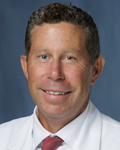 Director: David R. Nelson, M.D.
Director: David R. Nelson, M.D.
As a catalytic hub for translational research, the Clinical and Translational Science Institute (CTSI) last year helped more than 1,500 investigators, graduate students, trainees and research professionals navigate the research landscape, find potential collaborators and access CTSI services. CTSI programs and resources contributed to more than 250 scientific publications. Accomplishments toward the CTSI’s strategic plan goals include:
Translational Research Environment
The Office of Clinical Research progressed in its enterprisewide implementation of the OnCore clinical trials management system, creating opportunities for portfolio-based clinical trials reporting and centralized financial management for non-federal trials. CTSI programs also introduced several new research services. The CTSI Recruitment Center facilitated development of institutionwide guidelines for using social media to recruit study participants and created the UF Studies Facebook page as a central resource for promoting clinical research and advertising studies. The CTSI Data Coordinating Center was established to address gaps in services and technologies for clinical trial design and data management, data privacy and wearable device data management, and the CTSI Translational Drug Development Core launched services for bioanalytical drug metabolism, pharmacokinetics and early animal toxicity and efficacy studies.
Translational Workforce Training and Education
The CTSI Translational Workforce Development Program has taken a leadership role in reorganizing graduate, postgraduate and junior faculty development in clinical and translational science. In 2018, the CTSI supported more than 40 faculty members and trainees across its TL1, KL2, TRACTS and Mentor Academy programs. The CTSI welcomed four new TL1 Teams composed of eight predoctoral students from eight colleges, expanding the cohort of trainees participating in the TL1 Program’s novel team-based training experience. The CTSI’s K College, T Team and F Force concepts have grown to convene more than 150 early-stage investigators as well as T and F directors and trainees across multiple colleges. New K and T awards at UF are at historically high levels.
Learning Health System Initiatives
The UF Health Precision Medicine Program continued to expand its translation of genomic medicine into clinical practice. One of the original NIH-funded IGNITE network sites, the program received a five-year IGNITE II renewal grant in 2018. The program has led clinical implementation of genotype-guided therapy for 12 patient populations spanning three hospitals and 23 clinics.
The CTSI Learning Health System Program developed and implemented pilot projects in collaboration with UF Health stakeholders and citizen scientists, including studies focused on genotype-guided pain management for patients undergoing arthroplasty surgery, and inpatient delirium management. It also facilitated participation of OneFlorida partners in three national PCORnet health system demonstration projects focused on high utilization, and quality and safety benchmarking for children.
Statewide and National Collaborations
Celebrating its seventh year at UF, HealthStreet has expanded its reach to 46 counties and enrolled close to 11,000 members in its research registry, the majority of whom are minorities underrepresented in research. In 2018, HealthStreet collaborated with other CTSAs to disseminate six national Our Community, Our Health town halls.
As coordinating center for the OneFlorida Clinical Research Consortium, which encompasses more than 15 million patients, the CTSI bridges two national research networks: the CTSA consortium and PCORnet. Investigators can now use i2b2 to query UF Health, OneFlorida (statewide) and CTSA Accrual to Clinical Trials Network (34 sites nationwide) data repositories for cohort discovery. In 2018, OneFlorida’s research portfolio grew to include 57 active observational and interventional studies.
Diabetes Institute
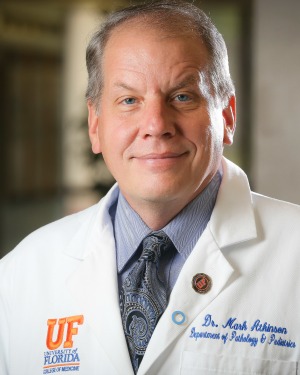 Director: Mark Atkinson, Ph.D.
Director: Mark Atkinson, Ph.D.
The UF Diabetes Institute, or UFDI, was formed in 2015, with the goal of creating a collaborative network of researchers, practitioners, students, alumni and partners to work together for a mission of seeing a diabetes-free world.
With 30.3 million Americans living with diabetes, 34 percent of adults in the U.S. having pre-diabetes, and approximately one quarter of patients admitted to a UF Health Shands Hospital having diabetes as part of their medical diagnosis, our mission is increasingly urgent. In 2018, the UFDI saw unprecedented growth for some of UF’s hallmark diabetes programs, hence the breadth of diabetes efforts that could be highlighted is immense. Below is a brief snapshot of recent programs dedicated to research, teaching and improved patient care as well as public outreach at UF:
Research and Training
- In addition to serving as the coordinating center for the JDRF’s Network for Pancreatic Organ donors with Diabetes, or nPOD, for over a decade, Drs. Mark Atkinson and Todd Brusko have expanded the organ donor research program repertoire to include Human Atlas of Neonatal Development & Early Life-Pancreas (HANDEL-P) and HANDEL-Immunity (HANDEL-I) efforts, determining normal pancreatic and immunologic development during the first 10 years of life. Dr. Atkinson also provides leadership to the NIH-HIRN Human Pancreas Analysis Program.
- Drs. Atkinson, Brusko, Michael Clare-Salzler, Harry Nick, Kevin Otto and Bernd Bodenmiller were selected to lead one of five Tissue Mapping Centers for the new NIH Office of the Director-supported Human BioMolecular Atlas Program, or HuBMAP, to generate 3D cellular maps of normal human lymph nodes, thymus and spleen, comprising the lymphatic system.
- Importantly, a P01 Program Project Grant (Drs. Atkinson, Brusko, Clare-Salzler, Michael Haller, Desmond Schatz, Clayton Mathews, Patrick Concannon, Martha Campbell-Thompson and Ed Phelps) with years of continuous NIH support for the study of genotype:phenotype relationships in Type 1 diabetes was renewed for its fifth consecutive funding cycle.
- Collectively, UFDI investigators account for $49.7 million in current funding invested in diabetes research, engaging over 125 investigators from nine colleges at UF.
- Drs. Michael Haller and Martha Campbell-Thompson completed their NIH-funded DP3 demonstrating reduced pancreas volume in children at risk for developing Type 1 diabetes.
- The University of Florida remained the world’s top recipient of research funding from JDRF.
- Dr. Kenneth Cusi is leading a recently launched UF Health study that could heighten awareness of fatty liver disease among physicians and those patients who are often the most susceptible — those with Type 2 diabetes. During the next year, Cusi and his collaborators will test 1,000 people with Type 2 diabetes for nonalcoholic fatty liver disease, liver inflammation, scarring and cirrhosis at UF Health clinics.
- A TrialNet study led by Dr. Michael Haller found that an existing drug, ATG, preserves insulin production in new Type 1 diabetes cases.
Clinical Care
- With 14,710 outpatient visits in 2018 (~65 percent with diabetes), the UF adult endocrinology and diabetes has seen a four-fold growth in outpatient visits in the past five years. Moreover, the division provided 6,797 inpatient consults and follow-up visits at UF Health Shands Hospital in 2018.
- With 22 endocrinologists and advanced registered nurse practitioners, the UFDI hosts the second-largest regional endocrine, diabetes & metabolism program.
- In the 2016-17 U.S. News & World Report, UF ranked 31st among national adult endocrine programs (second in the state of Florida)
- The pediatric endocrinology and diabetes program was the 23rd ranked program in pediatric endocrinology by U.S. News & World Report.
- The Pediatric Diabetes service sees over 1,000 unique diabetes patients per year and continues to offer leading-edge care to children and families affected by diabetes.
- The Florida Diabetes Camps, directed by UF pediatric diabetes faculty, served over 500 children with diabetes in 2018.
- The Pediatric Endocrinology group now boasts 10 Faculty, two ARNPs, two registered nurses/certified diabetes educators, two registered dietitians and psychology support embedded in our clinics. We offer diabetes education five days per week and evening classes in advanced diabetes pumping and continuous glucose monitoring.
Clinical Education and Research
- With six physicians in-training in the endocrinology fellowship program, UF is the second-largest adult endocrine training program in the state of Florida (after Miami, which has eight fellows in training).
- Over 45 peer-reviewed original manuscripts were published by UFDI clinical faculty and trainees in 2018 alone (over 100 manuscripts published in past five years).
- More than 10 randomized control trials and research studies are ongoing in Type 2 diabetes, obesity and nonalcoholic fatty liver disease.
Outreach and Involvement
- The American Diabetes Association’s Safe at School Working Group, including the efforts of Dr. Anastasia Albanese-O’Neill, ensures the diabetes management needs of students across the United States are met so these children are healthy and safe when they are at school and school-sponsored activities.
- The UFDI provides a variety of educational offerings in the use of diabetes technology, including an introductory class on diabetes technology, insulin pump training (start and advanced), CGM training, and training on data transfer and interpretation. Patients and their family members have the option to participate in diabetes technology education in person, in a group setting, or via telehealth using Vidyo software. This was made possible through a grant from the Children’s Miracle Network.
- Drs. Ashby Walker and Michael Haller were awarded a grant to study ways to improve access to care for underserved adults and children living with Type 1 diabetes. The program, ECHO Type 1 Diabetes, aims to help primary care physicians in Florida and California attain a greater level of expertise on a complicated disease by addressing the racial, socioeconomic and geographic disparities that affect health outcomes for these patients.
- A Student Ambassador program consisting of a group of motivated, diverse students was launched by the UFDI. The ambassadors, who are committed to supporting the Institute’s initiatives, received a book scholarship.
- The UFDI reached almost 2,000 people through its numerous outreach initiatives, including glucose screenings, lab tours, seminars, community carnival and World Diabetes Day events.
Emerging Pathogens Institute
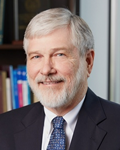 Director: J. Glenn Morris, M.D.
Director: J. Glenn Morris, M.D.
The Emerging Pathogens Institute, or EPI, continues to maintain a unique multidisciplinary research program, focusing on new and emerging pathogenic microorganisms causing disease in humans, animals and plants. Reflecting the global nature of such work, EPI investigators have collaborations in over 75 countries, studying Zika, dengue, chikungunya, malaria, cholera, AIDS, tuberculosis, xanthomonas (in plants), orbiviruses (in deer) and a range of other pathogens, as well as emerging global issues such as antimicrobial resistance.
EPI has continued to play a major role nationally and internationally in work with the Zika virus, including reporting of some of the earliest Zika isolations in the hemisphere associated with EPI study sites in Haiti. In studies funded by the European Union, EPI investigators have maintained ongoing surveillance for Zika and other arboviruses in a cohort of pregnant women in Haiti, with monitoring of long-term health outcomes in children born to infected mothers; in related studies, Dr. Maureen Long (UF College of Veterinary Medicine) has been responsible for development of a pregnant sheep model for Zika, a critical step in understanding the pathogenesis of this devastating virus.
In work with other arboviruses, Dr. Derek Cummings (UF College of Liberal Arts and Sciences) was funded by NIH for ongoing studies of antigenic and genetic variation of dengue, with multiple publications in Nature and the Proceedings of the National Academy of Sciences. Dr. Rhoel Dinglasan (Veterinary Medicine) and collaborators in the U.S. and Japan were awarded $3.2 million by the Global Health Innovative Technology Fund for work on a promising new vaccine to prevent malaria, and are involved in ongoing basic science studies here in the U.S. linked with field studies in Africa. And closer to home, Dr. John Lednicky (UF College of Public Health and Health Professions, or PHHP) was responsible for the first human isolation of Keystone virus, a mosquito-borne virus which appears to be endemic in north Florida.
Among a number of other highlights, EPI investigators, with National Institutes of Health funding, continue to explore the epidemiology and evolution of cholera in Haiti, with recent extension of cholera studies to Goma, DRC; as well as ongoing field work in Bangladesh being conducted by Dr. Eric Nelson (UF College of Medicine, or COM). At a basic science level, Dr. Afsar Ali (PHHP) recently co-authored a paper in Nature Communications exploring mechanisms underlying the action of cholera bacteriophage. Also in the field of enterics, Dr. Stephanie Karst (COM) was funded by NIH for continuing studies of norovirus, with a major paper appearing in Cell Host and Microbe. Dr. Robert Cook (PHHP) received major NIH funding for his continuing work with HIV epidemiology; Dr. Marco Salemi (COM) received NIH funding for ongoing studies of SIV, with an associated publication in Nucleic Acids Research. Dr. Charles Peloquin (UF College of Pharmacy) was part of a group that published in Science Translational Medicine on drug biodistribution in TB meningitis. And Dr. Erica Goss was invited by Nature to write a News & Views article discussing recent published research surveying the disease ecology of asymptomatic wild plant populations infected with a diverse array of Pseudomonas species.
Taken together, it has been a highly successful year, with over 160 research poster abstracts presented by EPI students and investigators at our 2018 EPI Research Day. While it is difficult to predict what new pathogens will emerge in 2019, EPI has built a strong interdisciplinary investigative group, and we look forward to ongoing studies (and challenges).
Evelyn F. and William L. McKnight Brain Institute
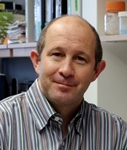
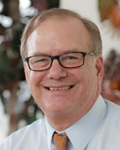 Executive Director: Todd E. Golde, M.D., Ph.D.
Deputy Director: Steven T. DeKosky, M.D.
Executive Director: Todd E. Golde, M.D., Ph.D.
Deputy Director: Steven T. DeKosky, M.D.
The Evelyn F. and William L. McKnight Brain Institute celebrated its 20th anniversary in 2018. Our keynote speakers to mark the occasion were Mary Woolley, president of Research!America, the nation’s largest nonprofit public education and advocacy organization for medical and health research, and Jennifer French, executive director of the Neurotech Network and one of the world’s first “bionic women.”
French is an incomplete quadriplegic who, thanks to advancements in assistive technology, can stand, transfer, exercise and live independently. In a moving talk, she reminded us of how our science can transform lives, and of the importance of partnerships between scientists, patients and patient advocates.
Woolley discussed the important role of advocacy by scientists and the need to communicate what we do in simple terms. She stressed the importance of creating a dialogue with our legislators and doing so with an engaging and concise message about our science. Indeed, her formula of describing “Then, Now and Imagine” is what we will use to describe how far the MBI has come and our vision for the future.
Then: Twenty years ago, MBI founding director William Luttge, Ph.D., described his vision for the MBI, which still resonates today. The MBI would provide the intellectual and physical infrastructure to support rapid advances in the fundamental understanding of the normal, injured or diseased nervous system using the most contemporary research tools. With the opening of the MBI, neuroscience at UF was, literally and figuratively, put on the map, but Luttge also knew the fundamental need for such an institute. His answer to the question, “Why do we need a brain institute?” was simple — “Neurological disease is a huge problem.” His forward-looking solution to this problem was to establish a focal point — i.e., an institute — to develop the multidisciplinary teams and approaches to rapidly translate fundamental findings into clinical and commercial applications.
Now: The MBI has renewed its role as the administrative home and coordinating center for neuroscience and neuromedicine research on the UF campus. Although it is also the name of a building, the MBI is truly an institute without walls. Across campus, over 200 faculty conduct neuroscience research, with hundreds of trainees embedded in our laboratories. Collectively, our National Institutes of Health funding for 2018 was approximately $50 million, which is remarkable growth given that NIH funding ranged from $25 million to $30 million per year from 2008-2014.
The multidisciplinary teams Luttge imagined are now in place and making a difference. UF teams have contributed to notable advancements, including deep brain stimulation for movement disorders and novel immunotherapies for incurable brain cancers. Yet, the statement that “neurologic disease is a huge problem” remains unchanged. If anything, the problem is larger due to our aging population.
In addition to research, the MBI invests in efforts to complement existing educational programs, support travel, provide training enhancement opportunities and host conferences. Outreach efforts include hosting scientific leaders from other institutions and supporting philanthropic partners to leverage their efforts.
We dramatically increased the visibility of MBI researchers through enhanced communications efforts. In 2018, our website had over 70,000 page views — a 40 percent increase from 2017. Our researchers’ articles in The Conversation were read over half a million times and picked up by major publications including Scientific American, Smithsonian Magazine and the Chicago Tribune. We launched Facebook and Twitter accounts to further disseminate our researchers’ work to new audiences.
Imagine: Working together, we will change the lexicon regarding many neurologic and psychiatric diseases and disorders and the effects of brain aging from inevitable, untreatable and incurable to preventable, treatable and curable. Our amazing faculty and staff, who are dedicated to making a difference, will leverage our intellectual capital and developing technologies to make discoveries and impacts that will translate into interventions that benefit patients’ lives.
Genetics Institute
 Director: Patrick Concannon, Ph.D.
Director: Patrick Concannon, Ph.D.
In 2018, the University of Florida Genetics Institute (UFGI) welcomed 20 new faculty members from five different colleges at UF. The 233-member faculty of the UFGI now represent seven colleges and 51 academic departments as well as the libraries and the Florida Museum of Natural History. During 2018, UFGI investigators secured $74 million in sponsored research support, filed 56 US patents and published 829 scholarly articles. Their work appeared in a diverse array of prestigious, interdisciplinary journals, including Nature, Science, Cell, and Proceedings of the National Academy of Sciences.
Mission
The aim of the UFGI is to promote excellence in the areas of genetics and genomics at the University of Florida by: (1) building community, facilitating collaboration and creating opportunities for intellectual exchanges among investigators working in diverse taxonomic systems but with a common set of approaches in genetics and genomics, (2) supporting recruitment and retention of outstanding faculty in the areas of genetic and genomics, (3) supporting graduate education in the areas of genetics and genomics and (4) enhancing the ability of researchers at the University of Florida to compete for multidisciplinary research grants in the area of genetics and genomics.
In 2018, the UFGI supported a Pilot Grant program offering early support for multidisciplinary research initiatives that had the potential to mature into projects that would compete effectively for extramural funding. Five Pilot Grant awards totaling more than $185,000 were made to UFGI members representing three different colleges and the Florida Museum of Natural History.
Education
In 2017, the Genetics & Genomics Graduate Program, directed by the UFGI, had 30 students training in 11 different departments in five colleges. Three G&G students earned their doctoral degrees in 2018, bringing the total number of graduates from the program to 29. This unique intercollegiate program continues to grow, and welcomed its largest incoming class ever in 2018, 9 students. Last year the Kenneth and Laura Berns Award for Excellence in Genetics, awarded annually for outstanding scientific contribution by a G&G student, went to Enrico Barrozo, who is training in the laboratory of UFGI member David Bloom.
Honors
In 2018, three UFGI members were cited as being among the top 1 percent of most highly cited researchers worldwide over the last 10 years by Clarivate Analytics.
Outreach
The 2018 program of our annual cornerstone event, The Florida Genetics Symposium, was the most successful yet. Taking place Oct. 31 through Nov. 1, more than 550 people registered to attend — the most participants in the history of the event. The conference featured nearly a dozen distinguished speakers from UF and other institutions. Approximately 100 posters were presented, with student and postdoctoral associates receiving awards for best poster presentations. G&G students were particularly successful this year, taking three of the four student poster awards.
In 2018, the UFGI celebrated DNA Day, April 25, with a new outreach program directed by Peter DiGennaro, a UFGI member and an assistant professor in molecular nematology. As part of this program, graduate students from G&G and other programs at UF traveled to high schools in neighboring counties, where they engaged the local students in classroom-based scientific experiments and talked about their own choice to pursue science as a career.
Institute for Child Health Policy
 Director: Betsy Shenkman, Ph.D.
Director: Betsy Shenkman, Ph.D.
The UF Institute for Child Health Policy, or ICHP, continues its strong efforts to improve children’s health and reduce health disparities.
A 2018 capstone: The UF Board of Trustees approved funding for a new data science and information technology building to facilitate transdisciplinary collaborations and innovative, data-driven research that ICHP has championed at UF. When completed, the building will house researchers in computer engineering, data science, informatics, health outcomes and ICHP.
Among ICHP’s 33 faculty and affiliate members are three preeminence professors, four members of the Society for Pediatric Research, one member of the Pediatric Academic Society, one fellow of the American Statistical Association, one fellow of The Obesity Society and a member of the American College of Medical Informatics.
Our $23 million research portfolio (2017-18) includes funding from the National Institutes of Health, the Patient-Centered Outcomes Research Institute (PCORI), the Agency for Healthcare Research and Quality (AHRQ), the Centers for Medicare and Medicaid Services, the U.S. Department of Justice and others.
2018 Research Highlights
Focusing on Child Obesity
Two junior faculty received NIH mentored research (K) awards to further their research on child obesity.
- Michelle Cardel, Ph.D., R.D., M.S., will develop a weight loss intervention for teens using an evidence-based approach for adults that teaches impulse control, an essential skill for adhering to a healthy diet and regular physical activity.
- Dominick Lemas, Ph.D., will identify the mechanisms in breast milk that protect against child obesity by characterizing human milk interactions with the intestinal microbiome in exclusively breastfed infants during the first year of life.
Addressing Health Disparities with Data Science
With funding from the AHRQ, ICHP Director Betsy Shenkman, Ph.D., leads a team to improve the overall health and quality of care for publicly insured children and adolescents receiving antipsychotic medications, which increase their risk of obesity, high blood pressure and hyperlipidemia.
Stephanie Staras, Ph.D., links data given to clinicians at the point of care with targeted text messaging to parents and adolescents to improve compliance with the human papillomavirus (HPV) vaccine. The National Cancer Institute-funded project aims to reduce or eliminate HPV-related cervical cancer.
A study published in JAMA Pediatrics by Jaclyn Hall, Ph.D., uses linked mother-baby data to examine the effects of policy changes by tobacco retailers on child health outcomes in six southeastern states.
Mildred Maldonado-Molina, Ph.D., director of UF’s Family Data Center, leads a team funded by Florida’s Early Learning Coalition to develop a statewide early learning data repository, linking health, education and social services data to develop a child-care access index that determines the extent to which quality child care is locally accessible in Florida.
Lifespan Research: Taking the Long View
ICHP assistant director of research Lindsay Thompson, M.D., M.S., coordinates a national initiative with the UF Clinical and Translational Science Institute, or CTSI, and four other CTSIs to establish universal screening of adverse childhood experiences by pediatricians using electronic health records. Adverse childhood experiences can affect health risks later in life.
With renewed NIH funding, biostatistician Keith Muller, Ph.D., is working with researchers at the University of Colorado to develop new statistical methods that use risk factors from early in life to predict disease outcomes later in life, such as obesity, cardiovascular disease, stroke, diabetes and cancer.
Research Day
ICHP partnered with UF’s Department of Pediatrics for its first ICHP-Pediatrics Research Day, which coincides with Pediatric Grand Rounds on Feb. 7. The event, to be held annually, featured a poster session, networking reception and keynote address by Sarah Scholle, Dr.P.H., M.P.H., vice president of research and analysis at the National Committee for Quality Assurance in Washington, D.C.
Institute on Aging
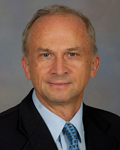 Director: Marco Pahor, M.D.
Director: Marco Pahor, M.D.
We have continued to capitalize on the remarkable successes in research, health care and education. The Institute on Aging has supported 55 extramural grants through cores, pilots and mentoring, with a total cost of $158 million, and $28 million in the 2018 annual period, which include major center grants, such as the Pepper Center, the P50 Sepsis project and the IOA contribution to the Clinical and Translational Science Institute KL2 program, as well as large National Institutes of Health-funded multicenter clinical trials and infrastructure grants, including the LIFE study, ASPREE, ENRGISE, MOTRPAC and JAX-ASCENT.
Research
Jacksonville Aging Studies CENTer (JAX-ASCENT) (total award $3.76 million, Pahor and Anton, principal investigators). This state-of-the-art clinical translational research facility for multidisciplinary research opened in May 2018.
The NIH Pepper Older Americans Independence Center has been renewed through 2022 (total cost $5.1 million, Pahor, principal investigator).
The MoTrPAC Consortium Coordinating Center: grant funded (total cost $9.3 million, Pahor, principal investigator) to assess the Molecular Transducers of Physical Activity has just completed the second year of planning.
The PCORI Weight Loss among Black Women with Obesity (total cost $2.1 million, Tucker and Anton, principal investigators): funded project is examining whether primary care physicians can assist black women with obesity in maintaining weight losses, following a lifestyle-based weight loss intervention.
Northwestern University and the University of Florida (principal investigator McDermott and Project 1 principal investigator Leeuwenburgh, total cost $3.7092 million) were awarded an American Heart Association Strategically Focused Research Networks (SFRN) center grant.
The ROAMM study (total cost, $2.6 million; Manini and Ranka, multi-principal investigators) aims to develop a sustainable research infrastructure built on the foundation of a smart watch app (ROAMM: Real-time Online Assessment and Mobility Monitor).
The Mind in Motion study (total cost, $5.6 million; Manini, Clark and Seidler, multi-principal investigators) will use multimodal brain imaging modalities to identify the neural correlates of walking and mobility disability in high-risk older adults.
The IOA has a very rich pipeline of 18 pending grants ($42.8 million), and has produced a high return on investment of $8.69 in extramural funding per dollar invested in research and an IDC return of $242/square foot regarding research lab space.
Health Care
Our clinical practice (Division Chief, Dr. Laurence Solberg) experienced another superb year of growth and expansion. The Ambulatory Care section, led by Dr. Susan Schneider, continued to increase the availability of outpatient appointments with additional geriatricians and opened a Senior Care practice at Spring Hill, adding to the Senior Care practices in the Clinical and Translational Research Building (IOA) and at Oak Hammock.
The Acute Care section, led by Dr. Jacobo Hincapie, increased the presence of geriatric medicine in the hospital. Our Geriatrics Consult Service teams of geriatricians and ARNPs expanded to provide consults to the new Cardiovascular and Neuromedicine hospitals, while continuing to support the surgical and medical services in the hospital with geriatrics-focused care.
The Acute Care for the Elderly, or ACE, Unit on Unit 74 in UF Health Shands Hospital in association with the Division of Hospital Medicine continues to impact the health outcomes of patients over 70 years with a geriatrician-led interdisciplinary team that guides their care plan. The initial data from the ACE unit showed a significant reduction in length of stay and cost of hospitalization.
There was continued growth in the Post-Acute Care section, led by Dr. Bhanuprasad Sandesara, through the partnerships forged between UF Health and the four skilled nursing facilities and long-term care centers our division serves.
UF Health Geriatric Medicine once again was recognized by U.S. News & World Report, with the department ranking higher in the Top 50 hospitals for geriatric medicine.
Education
Medical Education
The Clinical Education section, led by Dr. Mallory Otto, continues overseeing our fourth-year medical student clerkship.
Our Geriatric Medicine fellowship continues to thrive with its new curriculum focused on the geriatric care environments and partnerships we have cultivated in the UF Health system. The fellowship takes advantage of our UF Health facilities and clinical sites, with our geriatrics faculty leading the way in teaching clinical geriatrics care. We continue our commitment to the Veterans Administration Health System with rotations at the VA hospital with an innovative delirium consult team, palliative care and the geropsychiatry program.
Graduate Education
(Committee Chair, Solberg) We offer an online master’s degree in gerontology or graduate certificate in aging and geriatric practice. We offer 10 courses ranging from the basic biology of aging, geriatrics and age-related diseases, clinical neuroscience to the basics of research and epidemiology. We currently have 22 students enrolled in our online master’s program and 11 in the certificate program. Enrollees are professionals working in a variety of fields, including physicians, nurses, psychologists, directors of assisted living facilities, those working in the health care insurance industry, law enforcement officials, funeral home directors and policy makers.
About the author
